‘The Days of God’s Kingdom’ – Francis Frangipane
As we approach the fulfillment of many end-time prophecies, we must not allow ourselves to be moved by fear or unbelief. Increased wars, lawlessness and ethnic conflicts are signs that point to something more significant than themselves. Recall, the Lord’s word, He said, “So you also, when you see these things happening, recognize that the kingdom of God is near” (Luke 21:31).
Indeed, the turbulence we behold in the sea of humanity is caused by a storm in the heavenly places: The Kingdom of Heaven is drawing close! The signs around us are actually the effects of a confrontation between the Kingdom of God and the domain of hell. And while wars and rumors of wars fill the headlines, so there is another people returning to their homeland: the Kingdom of God.
For while great pressure is being exerted upon nations to exalt their ethnicity, so also there is a return in the true church to the purity and power of our origins in Christ. Like no other time in history, our identity in Christ must be greater, more compelling, and more real to us than any natural bonding we have in the world.
Jesus warned His disciples of this day, saying, “Nation will rise against nation” (Matt. 24:7). Thus, it should be no surprise that, in the original language of the Scriptures, the Greek word for “nation” is ethnos, from which we derive our word ethnic. Christ foresaw that ethnic conflicts, racially-based violence and religious wars would reach unparalleled heights at the consummation of this age.
Remember, it was in this very context of international upheaval that Jesus said, “This gospel of the kingdom shall be preached in the whole world for a witness to all the nations, and then the end shall come” (Matt. 24:14).
The Last Great Move of God Before we spend another trillion dollars on irreconcilable ethnic problems, we, the church, need to position ourselves as agents of redemption and healing, as it is revealed in the Kingdom of God.
I readily admit, not all unity is born of God. For some, unity means emptying one’s faith of core truths of the Christian message. We do not want unity without faith. But there is a realm Paul describes as maintaining “the unity of the Spirit . . . until we all attain to the unity of the faith” (Eph. 4:3, 13). And in the building, healing process that is occurring among leaders, we can extend grace as we submit to one another and learn from each other.
Here is what we agree upon: Jesus Christ is our Lord and savior. Our lives are rooted in the soil of His heart. His word defines our way and God’s kingdom is our homeland. Together, we are corporately beginning to manifest the Kingdom of God. This is exactly what was revealed to John. He wrote,
“Worthy art Thou to take the book, and to break its seals; for Thou wast slain, and didst purchase for God with Thy blood men from every tribe and tongue and people and nation. And Thou hast made them to be a kingdom and priests to our God; and they will reign upon the earth” (Rev. 5:9-10).
We were purchased by Christ for God, not to be isolated from each other by religious pride but to become a “kingdom and priests to our God.” We are a new creation; God has begun a second Genesis—a culture whose DNA consists of men from “every tribe and tongue and people and nation,” hand picked, called by name by the good Shepherd, and united with each other with values that transcend the boundaries of our ethnicity.
It is vital for us, as Christ’s church, to return to what Jesus called the “Gospel of the Kingdom.” The Gospel of the Kingdom makes disciples, not just converts. But while the Gospel of the Kingdom requires more, it gives more. For it is the gospel as Jesus lived it—full of power, love and reconciliation. And its “good news” is not simply that someday we will go to Heaven, but that this day Heaven is coming to us.
Francis Frangipane
eword@frangipane.org

